
Take control over what information search engines display to internet users about you or your website. Till today this was not something that we could have the power to control, but ORM DNA solves this problem.
order serviceWhat is ORM DNA?
SEO Sparta, a digital marketing agency serving Philadelphia and the surrounding communities, is proud to announce an innovative new marketing strategy developed by Alex Stepman: ORM DNA.
Alex, the chief SEO Engineer at SEO Sparta, began developing ORM DNA in early 2017 after watching a video of Matt Cutts, a former SEO maven for Google. In the video Matt discusses “snippets,” the part of a search result that presents the content of a page.
Alex realized a simple fact: Despite its emphasis on algorithms, Google did not have a definitive formula for presenting its listings. Sometimes the search engine surfaced information in one way; sometimes it surfaced information in a completely different way. Alex saw an opportunity for business owners to help Google understand information about their businesses.
Online Reputation Management (ORM) is the practice of monitoring and improving (or repairing, when needed) the reputation of individuals and businesses online. When combined with DNA, the unique structure of your website, ORM DNA will improve your online reputation and increase your website’s visibility.
ORM DNA is not a new algorithm requirement. However, if your marketing plan includes Search Engine Optimization (SEO), Pay Per Click (PPC) management, or Social Media (SM) marketing, ORM DNA will help you control how and where your website is ranked in search engines like Google, Yahoo, and Bing.
At the heart of ORM DNA is your website’s unique DNA. To effectively structure your website DNA, you must first understand online reputation management—what it is and why you need it. You must then understand how website DNA impacts ORM—and how you can control both to produce profitable results.
What is Online Reputation Management (ORM)?
To understand how Online Reputation Management impacts your business, you must answer two simple questions:
- Who are you? Your answer should include the basic information you contribute to the Internet, including your Name, Address, and Phone Number (NAP).
- Who are you to other people? Your answer should include the basic information other people contribute to the Internet about your business, including customer reviews, comments, and social media interactions.

Who Are You?
When a browser performs a search for a specific product or service, a search engine delivers thousands or millions of results. Search engine results may include organic results, like web pages, images, videos, or knowledge panels, or sponsored links. Since search engines strive to deliver accuracy, results often vary, even for the exact same term.
For a browser, this process is straightforward. Behind the scenes, however, the process is complex. Why? Search engines evaluate and understand each query in varying contexts.
This evaluation depends on several factors, like the browser’s location and search history. Even more important, however, is the search engine’s understanding of available information, which is based on key website elements—elements that work together to create a viable result.
NAP
The Name, Address, and Phone Number (NAP) of a business is a crucial element of any website. NAP may seem basic but this element is often the fundamental data search engines use to evaluate and understand your website. Most articles online about NAP discuss the importance of NAP for every website, especially local websites; few discuss how NAP impacts website visibility.
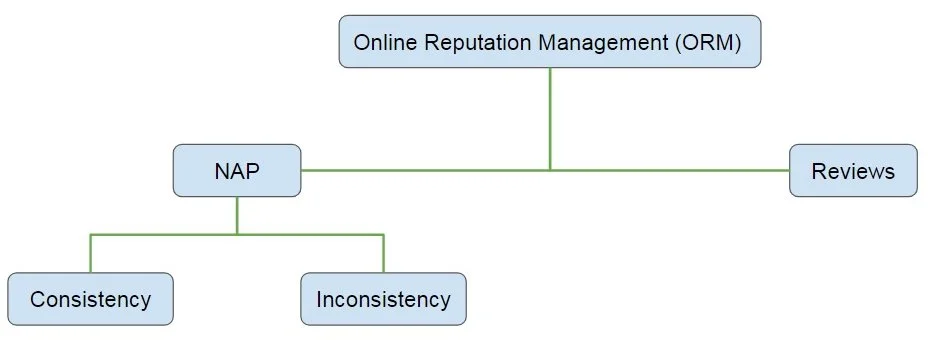
One potential issue with NAP is duplicate content. Google attempted to combat duplicate content with its Panda algorithm update. Per Google, Panda “reduced rankings for low-quality sites...which copy content from other websites.” Essentially, in the quest to deliver diverse results, Google and other search engines avoid websites with similar information.
Your NAP is likely reproduced across a series of pages—and search engines may recognize your inadvertent repetition as duplicate content. In theory, however, you can manipulate NAP to avoid duplicate content issues. Presenting your NAP in different formats across a series of pages will help search engines recognize your information as unique.
Displaying your phone number in different ways on different pages, for example — 215-900-9398 on one page and 215.900.9398 on another — will help search engines identify and display both pieces of content without penalty. After all, both are correct, yet not identical.
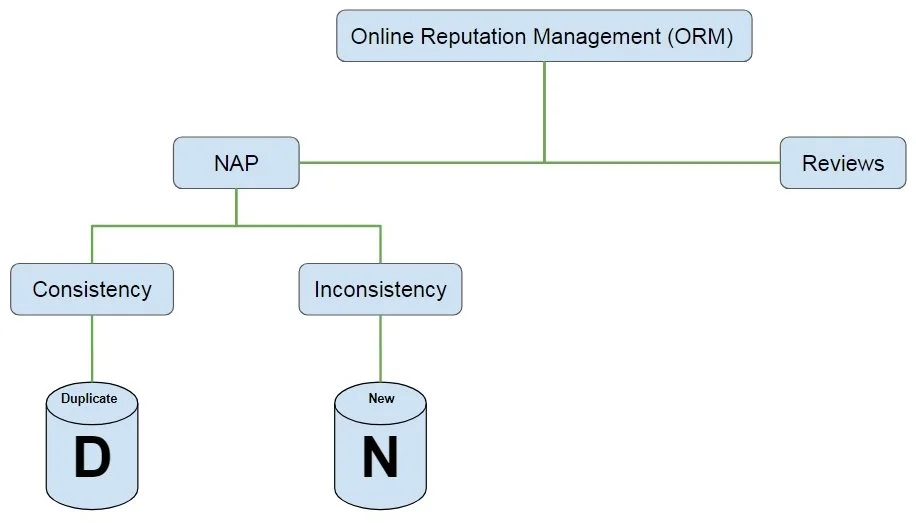
Until now, many SEO experts believed that business information submitted to local directories and websites had to adhere to strict guidelines to attract search engine visibility. NAP consistency was viewed as the best way to rank high in local SEO results. But consistency alone does not help your website outperform competitors. NAP consistency, in fact, prizes two key points that have no impact on website ranking:
- Search engines evaluate business information from various websites to validate your business information.
- Consistent information eliminates confusion, which will help potential customers get in contact with you.
It is important to keep these points in mind, yet also important to remember: By adhering to strict data consistency requirements, your various web pages may be recognized as duplicate content. So NAP consistency and duplicate content may seem to be in conflict.
Happily, ORM DNA bridges the gap between the two.
Who Are You to Other People?
Most searches for a business or product yield a similar result: a star rating, on a 1-5 scale, which synthesizes the feedback—positive and negative—a business or product has received across the Internet. Search engines collect feedback from a variety or platforms, including social media sites, like Facebook, or personal websites. The rating is often displayed in a text link or knowledge panel.
Customer Reviews
The ORM industry divides customer reviews into two categories: public and private.
- Public reviews are visible across the Internet and can be easily accessed by any browser.
- Private reviews are only visible to websites who solicit reviews. These reviews may be subject to change, depending on the website’s interactions with the customer.
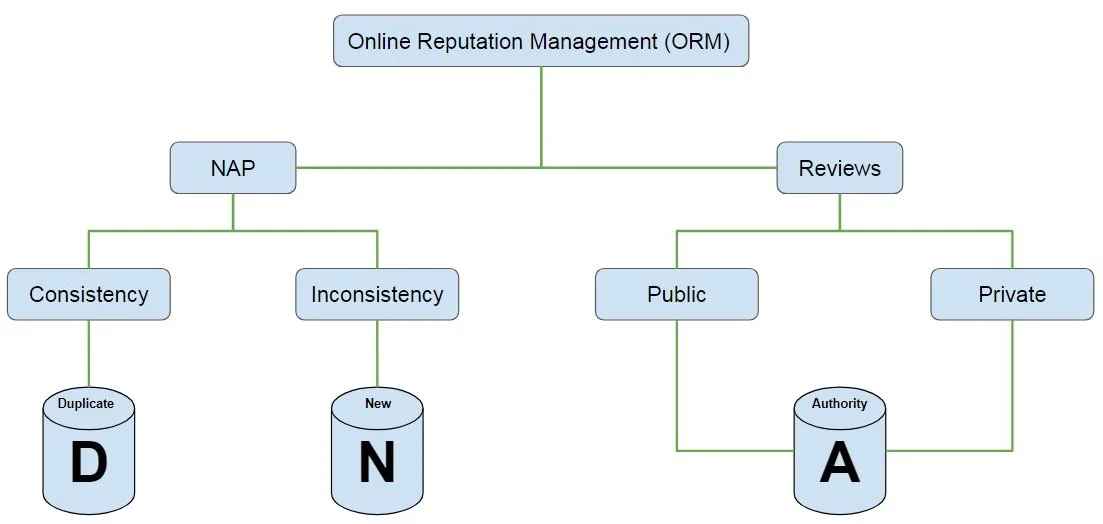
Over time, most private reviews become public; at this point, the search engines include the reviews in search results. Your business may have hundreds of positive reviews or a few negative reviews—whatever the case, your reviews do not impact your visibility in search engines (although some marketing agencies might disagree). However, reviews do generate one extremely valuable side effect: they may increase or decrease your page and domain authority scores. And your website authority will impact your website visibility in search engines (most marketing agencies will agree).
What is Website DNA?
Your website’s DNA is the unique information search engines associate with your online business or brick and mortar location. Website DNA is governed by at least three components, including:
- Development
- Design
- Content
To evaluate and understand your website, a search engine reviews these components, choosing useful information from any single component, to characterize your website’s DNA.
Website DNA is most clearly defined by a website’s development. If your website’s development satisfies algorithm requirements, your website DNA will be apparent to search engines.
If your website’s development does not satisfy the algorithms, search engines will attempt to define your website DNA by evaluating other parts of your website, including design or content elements. With each query, then, a search engine may use different parts of your website to produce a viable search result. In this case, your website DNA may or may not be consistent—and, at the very least, you will have no control over how search engines find and evaluate your website.
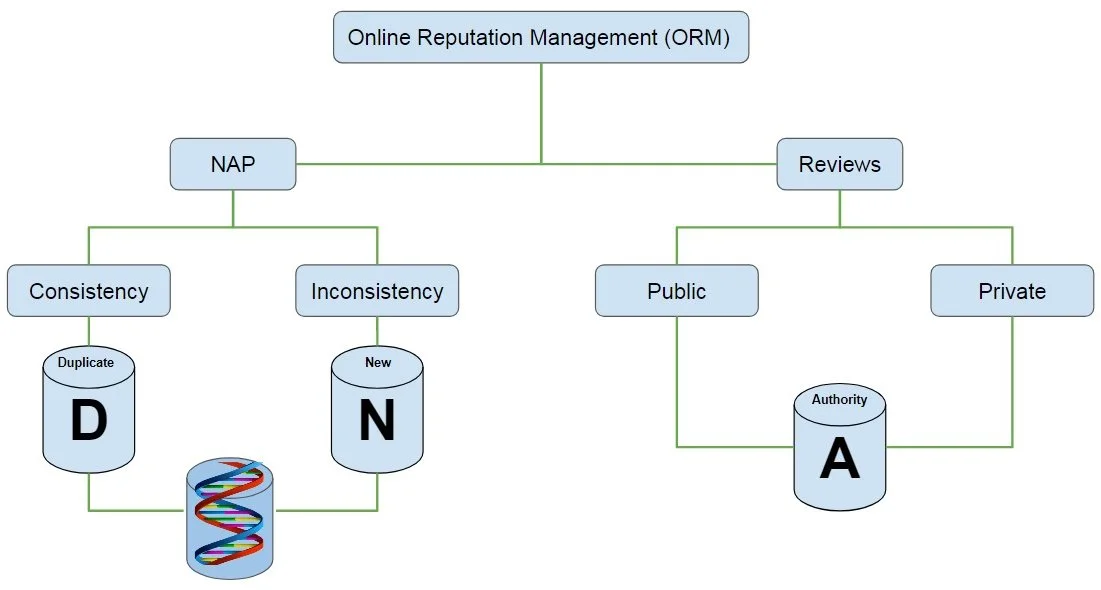
Poorly structured website DNA may or may not preclude your website from search results. However, a loss of control over your own business information can have bad consequences, including reduced website visibility and no placement in the search engine knowledge panels.
What is the Knowledge Panel?
When a browser searches for a business or product, many search engines deliver plain link results. The more sophisticated search engines, like Google, may also display a knowledge panel, “a box that appears to the right of their search results,” which includes relevant business information, like public reviews and contact information (citation: Google).
Knowledge panels enjoy a prominent space on the results page, offering businesses increased visibility. A properly structured website, with robust DNA, is more likely to appear in the knowledge panel.
Combining ORM with Website DNA
As noted above, search engines evaluate a variety of information about your website, including development, design, content, customer reviews, and more.
Ideally, these elements will form a coherent “composition” that makes sense to search engines. When a search engine easily understands your composition, your information can be presented clearly and efficiently to browsers as relevant search results.
The composition of elements that most effect your search ranking include Duplicate Content (D) + New Content (N) + Authority of Your Website (A).
The result, D+N+A=DNA, will be revealed in search results.
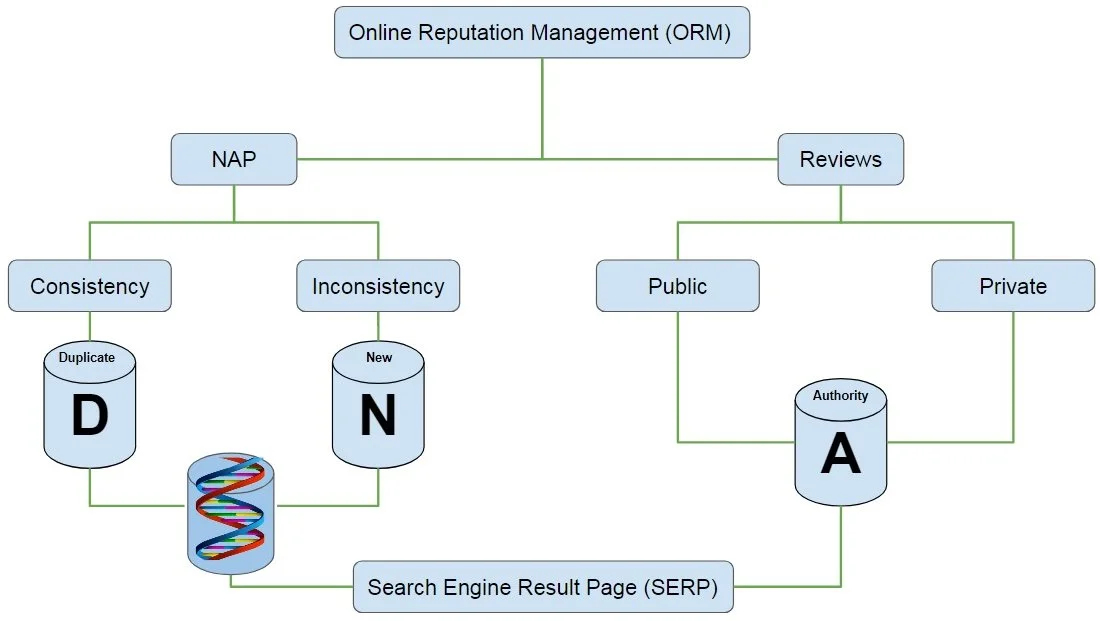
By controlling these elements, which is the goal of ORM DNA, you control how your website is displayed in search results. Your website visibility increases even as the search engines understand additional information about your business.
The Internet is a dynamic space. Browser’s habits change. To deliver the most relevant information, over time, search engine algorithms change to meet these habits. By providing viable and consistent information, ORM DNA meets the rapidly-evolving demands of browsers and search engines. When you control your ORM DNA, you take all guesswork out of the search equation and the search engines know precisely how to present your website.
Constructing your ORM DNA supports success today and tomorrow. When you control your ORM DNA you can also make changes to your website as you see fit, without sacrificing your visibility. And when the algorithms change you can easily evolve with the search engines to present the most relevant results.
Website owners and search engines share the same goal—to make the Internet a better, safer place, which delivers only accurate and informative results. ORM DNA helps you accomplish this goal by helping search engines learn more about your business.
Build Your Unique Website DNA Today
Alex Stepman now works one-on-one with clients to create a unique DNA structure that presents businesses the way clients want to be seen. As the premier expert, Alex is poised to elevate local SEO Sparta clients in the Philadelphia area to unprecedented levels of success with ORM DNA. After all, he invented it.
Testimonials
I would just like to say thank you for your effective online marketing services, for your friendly and professional support and answers to my questions!Frank Harrison
Thank you for the SEO services you delivered. You helped my website to attract new partners and promote my own services to a greater number of customers.Emma Mason
SEO SPARTA is the only agency that provides high quality online marketing and promotion services. The members of their team are real professionals in SEO.Maria Reyes











